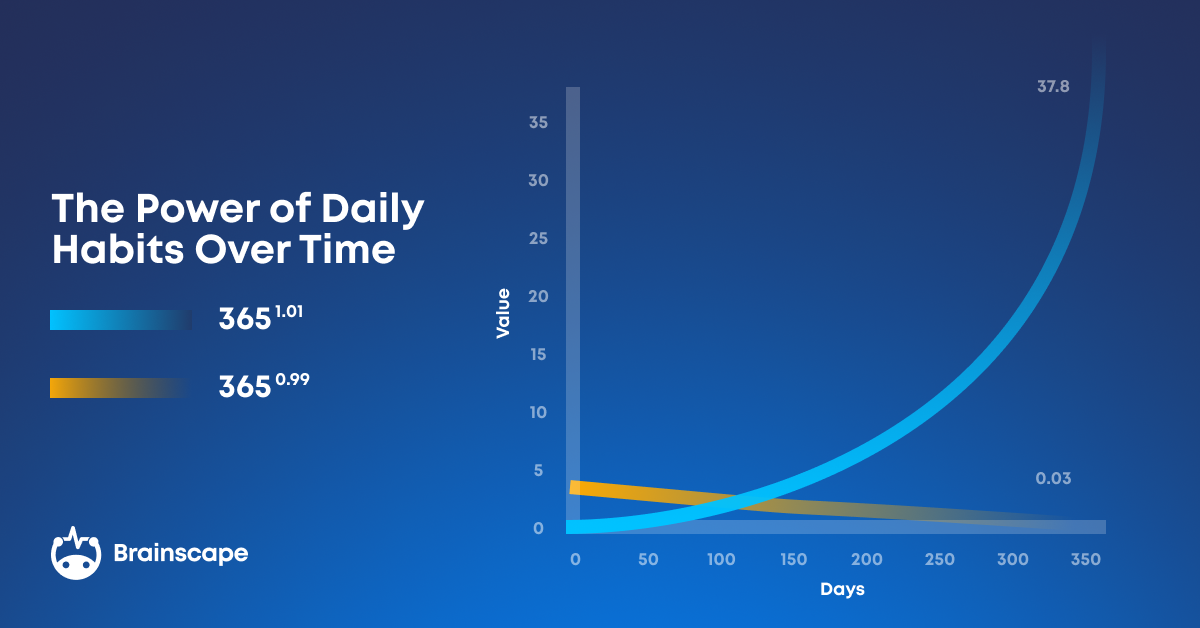We all want laser-sharp focus when studying—like the Terminator locked onto a mission. But in reality? It’s more like Homer Simpson in a room full of donuts.
Focus is a muscle, and if you don’t train it, every little distraction will pull you away.
Here at Brainscape, we're obsessed with the science of learning. Based on years of research, we've put together this guide to help you power up your concentration. Let’s get to it!
"Here are 12 cognitive science principles that'll help you build your attention span like a muscle so that your brain is as shredded and single-minded as the Terminator when you need it to be.
Exercise 1. Create a "Study Bubble"
Block distractions before they happen. Turn off notifications, gather everything you need, and find a quiet space (or use noise-canceling headphones). Let your housemates know you’re entering "Do Not Disturb" mode.
Exercise 2. Keep a Notebook Handy to Capture the Distractions and Take Them out of Your Head
Are random to-dos popping into your head? Jot them down in a notebook or app and deal with them after studying. Get them out of your brain so they stop hijacking your focus.
Exercise 3. Build Your Mental Resilience with... Cold Showers?
There’s been some interesting research on the health benefits of exposing your body to cold for controlled periods.
Cold showers build mental resilience, which helps you tolerate discomfort (like actually studying). Try ending your hot shower with 30 seconds of cold water. Suffer now, focus later.
Exercise 4. Use Meditation to Improve Your Focus
The benefits of meditation are well documented, so we won't hammer on them here. Rather, we'd like to connect the dots between meditation and your ability to focus.
Meditation is one of the most effective ways to train your mind. Start small—one minute of deep breathing, eyes closed, thoughts drifting. Over time, your ability to focus will grow stronger, making studying feel way less painful.
Exercise 5. Move Your Body! Exercise is a Great Stress Reliever
Exercise is another activity most people don’t feel like doing beforehand but feel great after. Inverting this “before vs. after” phenomenon is one of the greatest drivers of great focus, health, and happiness in life.
It takes mental fortitude to go for a run when you don’t feel like it. Every time you do, though, you’re building up mental stamina. You’re also helping your brain to function better. The combination of increased blood flow, oxygenation, endorphins, and mental resilience will improve your ability to focus on the other areas of your life.
Exercise 6. Hack Your Brain to Increase Your Attention Span
Hydrate. Eat brain food (lean protein, greens, and healthy fats). Cut the sugar crashes (unless they work for you). Sleep well. Your brain runs on fuel—don’t make it run on fumes.
The quality of the fuel you put in your body matters for clarity of thought, persistence of memory, and depth of reasoning.
Exercise 7. Use Flashcards to Study
One of the most effective tools for fast, efficient studying is adaptive, digital flashcards, which deliver information to your brain the way your brain was biologically designed to learn! (Via the learning principles of spaced repetition, active recall, and metacognition.)
Brainscape’s adaptive flashcards force your brain to stay engaged while studying. They’re efficient, portable, and scientifically optimized to improve focus. Plus you don't need to waste energy worrying about what to study: just hit the study button and a mix of flashcards at precisely your level will appear before you!
Exercise 8. Challenge Yourself with Good Literature

Another way to build your focus power is to read difficult writing you're interested in (The Economist, Science, Dickens, etc).
Keeping the cast of Crime and Punishment straight in your head as you work your way through this classic is the mental equivalent of running a half marathon wearing gumboots.
Reading difficult material successfully requires real concentration and determination, and your willpower will grow accordingly.
Exercise 9. Practice the Skill of Listening (and Paying Attention)
Listen with great attention to audiobooks or lectures. Focused listening is a life skill, one that can be applied in many areas.
Train your brain to focus by listening to audiobooks or lectures without multitasking. No scrolling. No Candy Crush. Just pure, undivided attention.
Exercise 10. Practice Sitting Still
Do you remember being taken somewhere formal as a child (funeral, wedding, classical concert, presidential inauguration speech) and being told to “Just sit still for goodness sake!” Well, although you’re probably better at it now, it may be time to revisit this skill.
Try timing yourself to see how long you can sit absolutely still. (Combine this with our previous point on meditation.) If you have kids, it may make you sympathize with their plight a little more. Either way, it’s a great exercise to build up your focus muscle.
Exercise 11. Monologue with a Ball
Huh?
Okay, hear me out: practice reciting all you know about a topic you're studying while throwing a ball in the air and catching it. It’s difficult to concentrate on both actions, but this builds your attention span and focus.
If tossing a ball in the air while you're trying to recite everything you know is too distracting, you could always pace your room or go for a walk. The study method of teaching your subject aloud in great detail, from the ground up, is known as the Feynman technique, and it’s a great way to consolidate your knowledge.
Exercise 12. Find Your Why
Finally, one of the most powerful tools for building focus is to remind yourself WHY you’re doing something. Link your goal to something that’s part of your identity, and you’ll unlock a whole new level of mental energy.
FAQ: Focus Exercises to Build Your Attention Span Like a Muscle
How do you train your focus and attention span?
Training your attention span requires regular mental workouts, much like physical exercise. Start with short periods of focused activity and gradually increase the duration. Use techniques like mindfulness, deep reading, and active recall to strengthen cognitive endurance. Consistency and deliberate effort are key.
Is attention span like a muscle?
Yes! Neuroscience supports the idea that attention functions like a muscle. It grows stronger with repeated, focused use. The more you practice resisting distractions and sustaining concentration, the easier it becomes to stay focused over time.
What exercises improve focus for ADHD?
For individuals with ADHD, structured routines and short, goal-driven tasks can help. Mindfulness exercises, physical activity, and tools like adaptive flashcards or focus timers can improve engagement and reduce mental fatigue. It’s also helpful to minimize distractions and use positive reinforcement.
What are focus 5 exercises?
“Focus 5” typically refers to five quick, intentional practices that help you reset your concentration. While different programs may define them differently, they often include deep breathing, mental visualization, physical stillness, single-tasking, and short bursts of focused effort followed by brief breaks.
Consistency is Key
“We don't rise to the level of our expectations, we fall to the level of our training” —Archilochus, Ancient Greek poet and soldier.

At Brainscape, we believe this: preparation is the key to achievement and success. Focus is a skill you can nurture in yourself; the more you work on it, the more natural it will become for you. It takes effort, but the results are well worth it. And the better you can focus, the better you'll be able to study.
In other words, if you work out your focus muscles, like Arnie gets body-ready for Terminator 7 (or is it 37?), then, come judgment day, you’ll perform like a champion.
Hasta la vista, baby.
[Kickstart your daily learning habit with Brainscape, the adaptive flashcard app proven to improve your memory retention and attention span.]
Additional Reading
- How to Focus While Studying: Tips for Better Concentration
- Are flashcards helpful for people with ADHD?
- Finding Study Motivation When You Want to Procrastinate
References
Horowitz, S. (2010). Health benefits of Meditation: What the newest research shows. Alternative & Complementary Therapies, 16(4), 223–228. https://doi.org/10.1089/act.2010.16402
Koulopoulos, T. (2017, May 4). Science Shows That Just 30 Seconds Of This Will Improve Your Outlook, Health, And Energy. Inc. https://www.inc.com/thomas-koulopoulos/science-shows-that-just-30-seconds-of-this-will-improve-your-outlook-health-and-.html
Malinowski, P. (2013). Neural mechanisms of attentional control in mindfulness meditation. Frontiers in Neuroscience, 7. https://doi.org/10.3389/fnins.2013.00008
Selhub, E., MD. (2022, September 18). Nutritional psychiatry: Your brain on food. Harvard Health. https://www.health.harvard.edu/blog/nutritional-psychiatry-your-brain-on-food-201511168626#:~:text=Eating%20high%2Dquality%20foods%20that,oxygen%2C%20which%20can%20damage%20cells.
